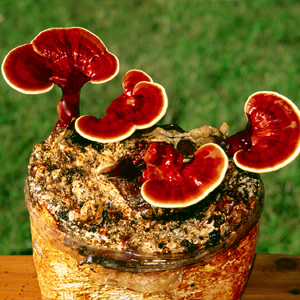Asian cultures have used the Reishi mushroom, also known as lingzhi, to enhance health and prolong life for thousands of years. Lingzhi mushrooms as a group actually represent a species complex of fungal entities, many of which are in use throughout the world. These fascinating fungi are so potent because of their unique collection of organic compounds and components, which include triterpenes, alkaloids, sterols, and various essential polysaccharides.
People have used Reishi mushrooms to help enhance their immune system, reduce stress and fatigue, and improve sleep. Traditional Chinese and Japanese folk medicine uses include hepatopathy (liver disease), chronic hepatitis, nephritis (inflammation of the kidneys), hypertension, arthritis, neurasthenia, insomnia, bronchitis, asthma, and gastric ulcers(10). Other purported uses of the Reishi mushroom include high blood pressure, high cholesterol, cardiovascular disease, viral infections, HIV, cancer, and pain during and after a shingles outbreak(1), (2).
Modern studies have positively linked reishi mushrooms polysaccharide content to the health of the immune system and preventing certain abnormal blood vessel formations. Furthermore, certain antioxidant properties of other organic compounds in reishi mushrooms neutralize free radicals, which can cause chronic diseases and premature aging.
The Reishi mushroom has antioxidant properties and may enhance immune response. Limited data from clinical studies suggest reishi can strengthen immune response in humans(4). It contains complex sugars known as beta-glucans (both beta-glucan polysaccharides and triterpenes) that may stop the growth and prevent the spread of cancer cells(4), (5). When animals were fed beta-glucans, some cells of their immune system became more active. Reishi mushrooms contain sterols that can act as precursors to hormones in the body. In addition, substances called triterpenes that may have blood pressure-lowering and antiallergy/antihistamine effects, and may inhibit tumor invasion(6) and tumor metastases(7). Reishi mushroom polysaccharides have demonstrated a close relationship between the immunomodulating effect and anti-tumor activity(8). Reishi mushroom hot water extract demonstrated an antioxidative effect that could protect the liver and kidney(9). Reishi mushrooms have also been shown to slow the process of blood clotting(3).
Talk to your doctor before taking Reishi mushroom if you are using anti-coagulant or anti-platelet drugs such as: Aspirin, Nonsteroidal anti-inflammatory drugs (NSAIDs), Warfarin, or Heparin. Reishi mushroom may also interact with high blood pressure medications, immunosuppressants, chemotherapy, or cytochrome P450 2E1, 1A2, and 3A substrate drugs(3).
General:
1)WebMD. Vitamins & Supplements: Reishi Mushroom. 2005-2016. http://www.webmd.com/vitamins-and-supplements/reishi-mushroom-uses-and-risks
2)Memorial Sloan Kettering Cancer Center. Reishi Mushroom. 2016. https://www.mskcc.org/search?keys=Reishi+mushroom
3)Memorial Sloan Kettering Cancer Center. Reishi Mushroom: For patients & caregivers. 2016. https://www.mskcc.org/cancer-care/integrative-medicine/herbs/reishi-mushroom
10)Wasser SP. Reishi or Ling zhi (Ganoderma lucidum). Encyclopedia of Dietary Supplements. 2005;1:603-22. http://dixonnetworkingassociates.org/files/reishi.pdf
Cancer:
4)Mao, T., Van De Water, J., Keen, C. L., Stern, J. S., Hackman, R., & Gershwin, M. E. (1999). Two mushrooms, Grifola frondosa and Ganoderma lucidum, can stimulate cytokine gene expression and proliferation in human T lymphocytes. International Journal of Immunotherapy, 15(1), 13-22. https://ucdavis.pure.elsevier.com/en/publications/two-mushrooms-grifola-frondosa-and-ganoderma-lucidum-can-stimulat
5)Sun LX, Li WD, Lin ZB, et al. Protection against lung cancer patient plasma-induced lymphocyte suppression by Ganoderma lucidum polysaccharides. Cell Physiol Biochem. 2014;33(2):289-299. https://www.karger.com/Article/FullText/356669
6)Chen NH, Liu JW, Zhong JJ. Ganoderic Acid me inhibits tumor invasion through down-regulating matrix metalloproteinases 2/9 gene expression. J Pharmacol Sci. Oct 2008;108(2):212-216. https://www.jstage.jst.go.jp/article/jphs/108/2/108_SC0080019/_article
7)Li YB, Wang R, Wu HL, et al. Serum amyloid A mediates the inhibitory effect of Ganoderma lucidum polysaccharides on tumor cell adhesion to endothelial cells. Oncol Rep. Sep 2008;20(3):549-556. https://www.spandidos-publications.com/or/20/3/549
Immune System:
8)Wachtel-Galor S, Szeto YT, Tomlinson B, et al. Ganoderma lucidum (’Lingzhi’); acute and short-term biomarker response to supplementation. Int J Food Sci Nutr. Feb 2004;55(1):75-83. http://onlinelibrary.wiley.com/doi/10.1002/(SICI)1097-0215(19970317)70:6%3C699::AID-IJC12%3E3.0.CO;2-5/abstract
Anti-Oxidant:
9)Shieh YH, Liu CF, Huang YK, et al. Evaluation of the hepatic and renal-protective effects of Ganoderma lucidum in mice. Am J Chin Med. 2001;29(3-4):501-7. https://www.ncbi.nlm.nih.gov/pubmed/11789593
